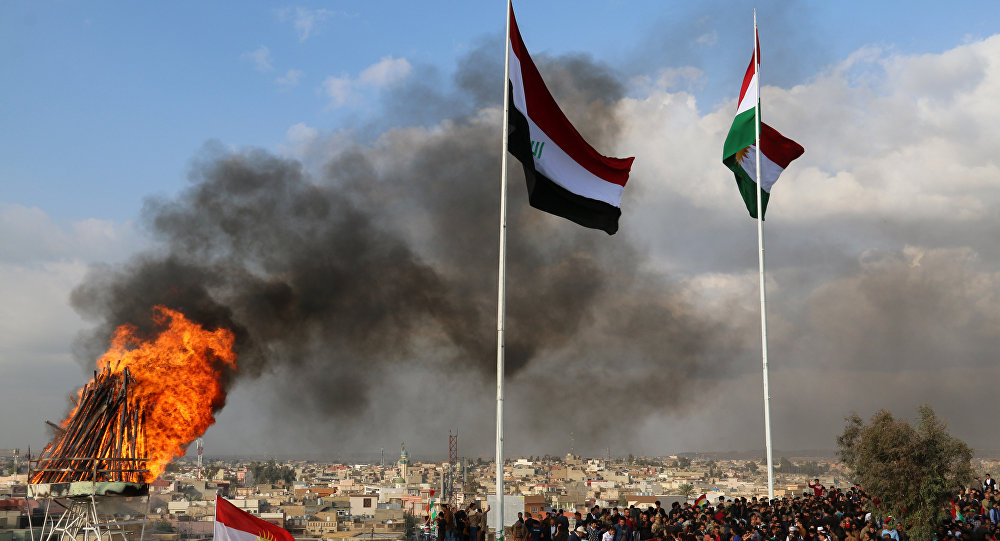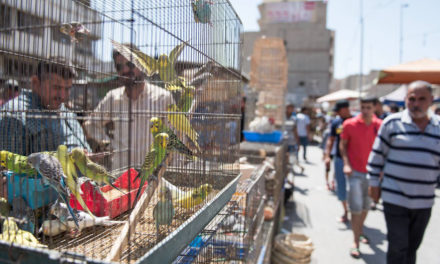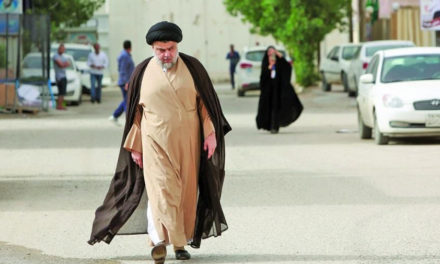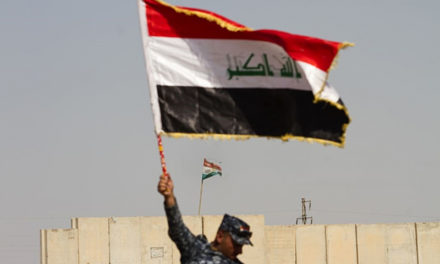(Photo: Marwan Ibrahim/AFP)
Managing federalism in Iraq has been a constant struggle for Iraqi policymakers. Remnants of a strong central state remains today and adjusting to federal practices has been a steep learning curve. Iraq not only has to figure out a system between the central government and its provinces, but also the regional government of the semi-autonomous Kurdistan Region that fits somewhere in between. Tweaking continues to take place between the federal government in Baghdad and the Kurdistan Regional Government (KRG) in Erbil to reach the right formula of governance, but many issues remain. Arguably the biggest between them are the disputed territories such as Kirkuk. Another issue is the management of Iraq’s foreign policy and how diplomatic affairs are handled. There are other disagreements such as authority over handling natural resources and budget sharing, but those concerns are not what have made the Kurdish flag contentious like disputed territories and foreign affairs.
The Kurdish flag, like other flags that represent the various Iraqi ethnicities, should not be contentious in Iraq. Iraqi Kurds are Iraqi citizens and do not represent a threat to Iraqi identity, but rather complement it. The Iraqi passport is the only passport in the world that contains the Kurdish language, which is slowly being incorporated into all state institutions, albeit long overdue. The only reason the Kurdish flag has become a point of contention is that it is simultaneously used as the flag of the KRG, which has attempted to expand the Kurdistan Region’s territory and secede from Iraq.
Under a functioning federal Iraq, respected by all parties, there would be no problems of representation and identity. One side would not feel threatened from the presence of another, and all would have agreement of a broader national identity. Unfortunately, a month into 2019 and controversy around flags remains.
At the start of January, the Patriotic Union of Kurdistan (PUK) raised the Kurdish flag on their political party headquarters in Kirkuk causing concern to certain Iraqis in the province and officials in Baghdad. The Kurdish flag being raised by a Kurdish party at their base should never be an issue, but because the flag has been exploited politically to determine whether the KRG has jurisdiction over the province, it remains one today. It is important to note as well, that the PUK used the flag raising at their headquarters as a PR stunt to counter accusations of treason over Iraqi Security Forces (ISF) reclaiming Kirkuk from the Kurdistan Democratic Party (KDP).
Later in January, the Kurdish flag became a controversial issue outside of Iraq, at the Agriculture and Food Conference in The Hague. What was meant to improve Iraq’s knowledge on agriculture was later marred with controversy over diplomatic protocol with the Iraqi Ambassador to The Netherlands, Hisham Al-Alawi. Upon arrival, the Ambassador promptly walked out, after noticing the flag arrangement was contrary to that agreed upon between the organizers and the Iraqi Embassy. What was meant to display only Iraqi and Dutch flags, was later changed to display the Kurdistan Region’s flag as well. The Ambassador’s decision to walk out sparked outrage from Iraqi Kurds online and generated further debate around the Kurdistan Region’s flag and the Kurdistan Region’s place in a federal Iraq.
The semi-autonomous Kurdistan Region of Iraq is acknowledged in the Iraqi Constitution. However, the constitution also makes it clear that foreign affairs is entirely under the mandate of the federal government in Baghdad. Legally, the constitution allows for the presence of cultural missions from regions under the authority of Iraqi embassies, but in practice, the offices of the KRG in foreign capitals are not under the authorization of the Foreign Ministry whatsoever.
Citing the constitution to claim recognition of the Kurdistan Region is correct, however, it is the Iraqi flag and Iraq’s diplomatic missions that represents all regions and provinces of the country on the international stage. Having said that, all that is written in the constitution is not always practiced and we have seen events held in London and Washington that have hosted both the Iraqi and Kurdistan Region’s flag. What distinguishes these events from the one in The Hague is that they have been done in coordination with the Iraqi Embassy and the Kurdistan Region’s representative office in those respective capitals.
In terms of protocol, Ambassador Al-Alawi had every right to walk out of the conference. But ultimately, he is not going to fix the problem of the KRG violating the Iraqi Constitution abroad by walking out of this event. For that to be resolved, it needs to be addressed by both Baghdad and Erbil. It is unlikely that Prime Minister Adil Abd Al-Mahdi, who is known not to begin or entertain confrontations, will be addressing this issue during his time in office.
For many years, the foreign offices of the KRG have been used to undermine the Iraqi state and at times lobby directly against the Government of Iraq. This was addressed to an extent by former Prime Minister Haider Al-Abadi during the war against Da’ish. Despite not being completely resolved, on the surface, there has been some change to the KRG foreign offices after the failed Kurdish referendum for independence. It is unlikely that the two main Kurdish parties of the KRG will adopt radically different strategies or forgo their ambitions for long-term independence. However, events that benefit all sides should be embraced rather than dismissed.
Outstanding differences between Baghdad and the KRG remain and it is going to take stronger and bolder Iraqi leaders and the judiciary to resolve them. In the meantime, both sides need to adopt more brotherly attitudes with one another, as the two are fellow nationals and neither one is going away or seceding anytime soon.

Hamzeh Hadad
Hamzeh Hadad is an Iraqi writer and commentator. He is currently a Master of Arts candidate at the Norman Paterson School of International Affairs.










